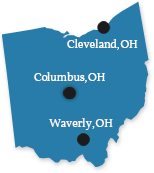Ohio product liability law provides an extra layer of protection for injured consumers. In many other types of injury cases, such as car crashes, the plaintiff must establish that the defendant was negligent. But, in the case of a defective product, strict liability generally applies to the manufacturer.
In simple terms, that means that the manufacturer of a defective product can be liable for harm it causes even if the manufacturer wasn’t negligent.
Under certain circumstances, suppliers along the pathway to the consumer may be held liable as if they were the manufacturer of the product. While some of these circumstances involve negligence, misrepresentations or other actions by the supplier, Ohio law also makes the supplier liable if the manufacturer is or would be liable for compensatory damages under Ohio product liability law, but the manufacturer is not subject to judicial process in the state or a judgment would be unenforceable because the manufacturer is or claims to be insolvent. This protects consumers by providing a way to secure compensation in a product liability case even if the manufacturer goes out of business or is otherwise out of reach.
As new business models evolve, questions arise about how existing law applies to those models. In the past few years, one area of controversy has centered around Amazon.com and the role it plays in third-party sales. Product liability law differs from state to state, and different state courts have reached different conclusions. In early October, the Ohio Supreme Court ruled that in at least some circumstances, Amazon is not a “supplier” under Ohio law, and so is not subject to supply-chain liability.
Stiner v. Amazon
The long road to the October 1 Ohio Supreme Court ruling started in 2014, when Logan Stiner–a student at Keystone High School in LaGrange, southwest of Cleveland–was found dead in his home. Initially, the sudden death of the high school athlete was a mystery. Then an autopsy revealed toxic levels of caffeine in his blood.
It soon emerged that Stiner had ingested pure caffeine powder, which a friend had obtained from a third-party supplier through Amazon.com.
Under Ohio law, if the friend had purchased the caffeine powder at a local health food store or gas station and it had turned out to be defective, to carry insufficient warnings, or in some other way fall under Ohio product liability law, the store would generally have been deemed a “supplier.” That alone wouldn’t have necessarily meant the store was liable, but would have opened the door to a possible claim under ORC 2307.78. But when Stiner’s father filed a product liability suit against the manufacturer, the third-party supplier, Amazon, and others, Amazon argued that it wasn’t a supplier under Ohio law.
The Ohio Supreme Court agreed, in large part because Amazon never had control over the product. Instead, the seller wrote the description, offered the product for sale through Amazon’s marketplace, and shipped the product directly to the consumer.
What Does this Mean for People Injured by Defective Products?
First, it’s important to note that this case involved a third-party supplier selling through Amazon’s platform, not a situation in which Amazon was the seller. The average shopper may not pay much attention to whether a product is offered by Amazon, offered by a third party but fulfilled by Amazon, or shipped directly by a third-party seller. But it makes a big difference from a legal perspective. Amazon’s argument and the Ohio Supreme Court’s decision relied on the fact that Amazon never had control of the product. When Amazon is the seller, the standard product liability analysis would typically apply, with Amazon part of the supply chain and subject to liability.
How far-reaching the impact of the ruling is in cases involving third-party suppliers remains to be seen.
The Ohio Supreme Court ruled that under the facts of this case, Amazon would not be considered a supplier. The same reasoning would extend to other platforms under the same circumstances. However, that leaves many open questions. Since each platform operates a bit differently, the Amazon decision doesn’t necessarily mean another company providing similar-but-not-identical services wouldn’t be considered a supplier. And, under the facts of this case, the third-party supplier handled all fulfillment and shipping directly–Amazon never had control of the product. The case doesn’t tell us how the courts will treat third-party sales that are fulfilled by Amazon.
Talk to an Ohio Product Liability Attorney
The Stiner ruling is being widely reported, and that could deter people with good claims from seeking legal advice. The headlines saying Amazon isn’t liable don’t come close to telling the full story, and don’t necessarily mean someone injured by a defective item purchased through Amazon or a similar platform doesn’t have a claim against that platform.
Even where a claim against the platform might fail, the injured party may have other options for securing compensation. For example, though Amazon escaped liability in the Stiner case, Stiner’s father reached settlements with other parties, including the company that imported the powder and the third-party supplier who sold the product through the Amazon marketplace.
It’s a complicated area of law and one that is still evolving. In addition to the unsettled questions mentioned above, the possibility remains that the legislature may choose to update the statutory language to account for a business model that didn’t exist when the law was written. Stiner’s father has said one goal of the lawsuit against Amazon was to bring greater attention to the issue in hopes that lawmakers would take action.
The best source of information about your options is an experienced Ohio product liability attorney. The attorneys at Plevin & Gallucci have been helping Ohio injury victims for decades and offer free consultations to ensure that injured people and their families have access to the information they need.
You can schedule yours right now by calling 1-877-4PLEVIN or filling out the contact form on this page.

